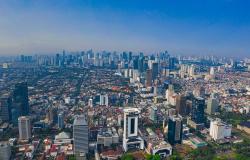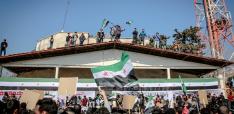Is Indonesia turning into a “fascist economy”?

Bhima Yudhistira Adhinegara and Muhammad Zulfikar Rakhmat argue that this is a struggle for the soul of Indonesia.
Indonesia is on fire, literally and politically. The streets of Jakarta and other cities are filled with smoke from burning tires, chants from furious crowds, and the choking gas of police crackdowns. The spark was officer pay gap—lawmakers brazenly awarding themselves housing allowances ten times the minimum wage. The flame spread when a young delivery driver was crushed beneath a police vehicle. But the deeper fuel is clear: Indonesians are rising against the military’s suffocating return to power.
President Prabowo Subianto, a former general once tied to human rights abuses under Suharto, is marching the country back toward a system Indonesians fought to dismantle in 1998. He has unleashed 100 new battalions of soldiers—not for defense, but for farming, feeding children, even making medicine. Food estates and free-meal programs are dressed up as welfare. In reality, they are camouflage for a military takeover of the civilian economy. What looks like public service is in fact power consolidation.
Parliament has already greased the wheels. In March, lawmakers rammed through revisions to the Armed Forces Law that expand the number of government agencies where active-duty officers can serve. Disaster relief, counterterrorism, border management, even the attorney general’s office—once run by civilians—are now fair game for men in uniform. This is not reform. It is regression, a deliberate dismantling of the democratic guardrails erected after Suharto’s fall. Students saw it clearly when they occupied Jakarta’s Fairmont Hotel in defiance, demanding the military be sent back to the barracks. They know what is at stake: ytheir generation’s future is being stolen in backroom deals.
When ordinary Indonesians poured into the streets, the government showed its true face. Protesters were not met with dialogue but with bullets and checkpoints, and threats of “treason.” Thousands have been rounded up. Social media was throttled. Workers and students demanding dignity were branded extremists. This is the language of authoritarianism, not democracy. It is the state declaring that citizens who dare to speak out are enemies of the nation.
And behind it all, the money tells the story. Indonesia’s defense budget is skyrocketing: $15 billion this year, $22 billion projected for next. It has grown by 166.5% between 2021 and 2026. A 40 percent surge in one year, at a time when schools are underfunded and hospitals overstretched. Officials insist it’s about “modernization.” But modernization does not require soldiers planting rice. It does not require officers sitting in civilian ministries. This budget is not about defending the country. It is about embedding the military into every corner of national life.
This is how fascist economies are built. Not with a single coup or a sudden collapse of democracy, but with the steady normalization of military control over the economy, the bureaucracy, and dissent. Indonesia still has a parliament, newspapers, and elections. But those institutions are being hollowed out. Each new battalion, each new appointment of a general to a civilian post, each mass arrest of protesters chips away at the foundations of civilian rule.
The world cannot shrug this off as just another case of “developing world instability.” Indonesia is the world’s third-largest democracy and a G20 economy. Its debt rating could be downgraded, worsening fiscal pressures. If it succumbs to military authoritarianism, it will not only betray its people’s hard-won freedoms but also set a dangerous precedent for the region. A democracy as vast and vital as Indonesia cannot be quietly strangled while the world looks away.
The choice now lies with Indonesians. They can surrender to a regime that cloaks militarization in the language of food security and welfare, or they can fight to reclaim the unfinished promises of 1998. The protests sweeping the country are not only about perks for politicians. They are about whether the people or the generals will shape Indonesia’s future.
Activists on the ground are right: this is a struggle for the soul of Indonesia. The time for polite warnings has passed. If Indonesians and their allies abroad do not act decisively, the barracks will once again rule the archipelago—not by coup, but by budget lines, bureaucratic decrees, and the steady suffocation of dissent. And by then, undoing the damage may be far harder than resisting it today.
Bhima Yudhistira Adhinegara is the Executive Director of the Center of Economic and Law Studies (CELIOS). Muhammad Zulfikar Rakhmat is the Director of the China–Indonesia and MENA–Indonesia Desks at CELIOS.
Photo by Tom Fisk


